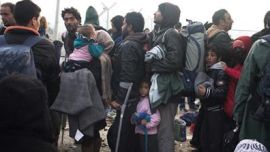Macedonia allows trickle of refugees to cross border
Border restrictions leave more than 11,000 stranded at camp in Greece, with many confused about their next steps.

A tiny trickle of Syrian and Iraqi refugees is being admitted into Macedonia at the Idomeni crossing on the border with Greece, as more than 11,000 remain camped out waiting for their turn.
Greek police said Macedonian authorities let in 320 people between Thursday and Friday morning. A few dozen were being admitted later in the day.
Keep reading
list of 4 items‘Mama we’re dying’: Only able to hear her kids in Gaza in their final days
Europe pledges to boost aid to Sudan on unwelcome war anniversary
Birth, death, escape: Three women’s struggle through Sudan’s war
The small number was a result of new restrictions imposed on borders last week.
Al Jazeera’s Hoda Abdel-Hamid, reporting from Idomeni, said that weather and living conditions at the Idomeni camp had deteriorated – with more refugees arriving each day.
READ MORE: Crisis looms as a new wave of refugees reaches Europe
She added that the “stranded” refugees in Greece complained that they were not being provided with enough information on how to continue their journey.
Most refugees in Greece want to seek asylum in other European nations, such as Germany or Sweden, and need to cross through Macedonia to do so.
“There is an overwhelming state of confusion,” our correspondent said. “No clear guidelines have been given as to what the stranded here need to do. Information spreads by word of mouth and often, it’s wrong.”
Syrian Saswat Estif, 26, has been at Idomeni for 15 days, waiting patiently to enter Macedonia.
He said “last night was cold and it rained a lot”, adding that “there’s not enough food”.
Crackdown on borders
The small number of refugee admissions follows a bid raised by Austria and nine Balkan states last Wednesday to stem the flow.
The group agreed to grant entry only to those “in proved need of protection” – a move which sharply reduced the intake and effectively excluded refugees from Afghanistan, a country where civilian casualties reached a record 11,000 in 2015.
That decision triggered desperate scenes over the past few days in Greece as refugees are faced with tighter controls.
Tensions flared on Monday, when Macedonian police fired tear gas and stun grenades at refugees who tried to break through the razor-wire fence between Greece and the Balkan nation.
“Unless you declare you are fleeing war, you will not be allowed through,” our correspondent said, commenting on the new restrictions.
‘Lack of information’
Despite contributing to the build-up of refugees on the Greek side of the border, Macedonia has complained about the overflow.
READ MORE: Why is Europe closing its borders to Afghans?
On Thursday, Macedonia’s Foreign Minister Nikola Poposki called on Greece to move the thousands of refugees stuck on its side of the border away to more suitable reception centres.
Poposki told The Associated Press that this would offer stranded refugees “humane and safe treatment”, instead of having them in tents a few hundred meters from the border.
“This is really not a solution,” Poposki said of the tent city. “If you really care about these people they should be hosted in reception centres that can host such a large number of people.”
‘Humanitarian crisis’
|
|
In total, up to 32,000 refugees are stranded across Greece, with Immigration Minister Yiannis Mouzalas sayingthat number could rise to 70,000 in March.
The pressure on Greece signals a looming humanitarian crisis, rights groups and aid agencies warned this week.
“Europe is on the cusp of a largely self-induced humanitarian crisis,” Adrian Edwards, spokesman for the UN’s refugee agency said on Tuesday.
“This is in light of a rapid build-up of people in an already struggling Greece, with governments not working together despite having already reached agreements in a number of areas, and country after country imposing new border restrictions.”